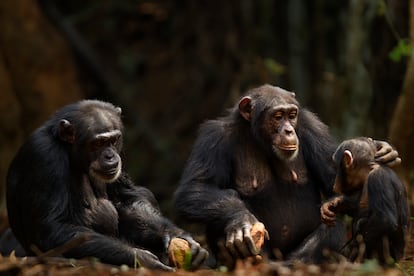Some animals take care of others in need even if they are not related
Great apes, elephants and dolphins stand out for their altruistic, selfless behaviors

Certain ideas are deep rooted in society; no matter how many times science disproves them. I remember that when I used to go to school, the teacher would explain to the class that while humans are rational, animals act on instinct. Twenty years have passed and, in that time, numerous evidence of animals learning from their environment and acting flexibly has been provided. However, one can still find dualistic discourses that are based on this simplistic idea, even within the academic world, reducing animals to mere biological machines whose behavior is determined solely by genes.
According to this view, cooperation occurs only between related animals and, if an individual falls ill, it is abandoned by the rest of the group because that is how natural selection works. In contrast, humans are rational beings, aware of our actions. We share values that make us care for injured individuals even if we are not linked to them in any way. These types of messages are easy to grasp, make us feel special and spread like a virus. Complex answers, on the other hand, are less popular, even if they are often more accurate.
By “animals” we are talking about more than a million different species. Many of them, like sea sponges or mussels, are probably just biological machines. And it is true that large numbers of species do lack the cognitive complexity and empathy to perform certain altruistic actions. But at this point, it has been shown that humans are not the only ones on the planet who help and care for those in need. Chimpanzees, elephants and cetaceans, in particular, stand out for this behavior.
Chimpanzees
In Gabon, chimpanzees apply insects to treat the open wounds of other individuals, and in Gombe, they have been seen using leaves to clean them. Chimpanzees living in the Taï forest adapt their behavior to the specific needs of those who are sick; for instance, the dominant males do not let other members of the group disturb them, and everyone waits for the injured to start walking before they resume the march. This kind of care usually occurs between related individuals, but not always.
In 2011, one of the most detailed studies regarding a case of help among chimpanzees in the wild was published. For two days, a teenage individual was observed helping an injured female carry her baby. The mother could not keep up with the rest of the group and stopped frequently, leaving the infant on the ground every time she did. The young male would then pick up the baby and carry it for much of the journey. Other males had been observed carrying babies in this chimpanzee community, but never for as long. The adolescent was not related to the mother.
Finally, there are numerous reports of chimpanzees adopting orphaned infants. As in humans, adoption in chimpanzees involves the regular provision of maternal care such as transportation, feeding, defense and grooming. In the Taï forest, adoptions by unrelated members of the group, such as young female friends of the deceased mother, are common.
In all these cases, prosocial behavior improved the situation of those in need, accelerating their healing, allowing them to keep up with the group or survive without a mother’s care. This means that chimpanzees are able to understand the situation of other individuals in distress and flexibly provide appropriate help.
Elephants
A remarkable number of stories are known about elephants assisting others in need. In most cases, they are mothers and sisters trying to pick up a sick calf, help it cross a river or rescue it from the mud; however, sometimes assistance also occurs between unrelated individuals, even strangers.
An article published in 2006 narrates in detail the events surrounding the fainting and subsequent death of a matriarch named Eleonor. Two minutes after she hit the ground, another matriarch from outside the family hurried over with some degree of excitement. First, she sniffed and touched the body with her trunk and foot; then she lifted Eleanor back to her feet with her tusks. The matriarch died the next day and her body was visited by several different groups of elephants.
A recent study proposes that elephants, just like humans, have self-domesticated. For this reason, despite the fact that our evolutionary lineages diverged when the first placental mammals appeared, we share many characteristics such as a marked prosocial behavior, reduced aggressiveness, a long youth and a complex communication system.
Cetaceans
Cetaceans are characterized by high cognitive and communication abilities that allow them to create and maintain close social relationships. Dolphins, specifically, are known for their propensity to help others in different ways, flexibly adapting their help to each situation: they free individuals that get caught in fishing nets, hold the sick near the surface in the right position to prevent them from drowning, stay close to a calving female, get between a boat and an injured dolphin to prevent them from colliding, and even collaborate to form a raft to transport a paralyzed individual.
Anecdotes of cetaceans helping other species have also been reported. On one occasion, two dolphins were seen taking turns holding a newborn porpoise at the surface. Humpback whales harass orcas that are hunting other species, putting their own health at risk, as orcas often attack them when they try to interfere with their hunt.
As we continue to study wild animals, we will probably discover more altruistic behaviors in more species. However, it is also a mistake to fall into the cliché that animals are better than people. Again, this is a simplistic idea that does no justice to reality and separates us from nature. Chimpanzees also kill other individuals, and there is a known case of a bottlenose dolphin that, instead of helping a female that was emitting distress signals, decided to abandon her.
Humans are one more animal within natural diversity. We are not better, worse or more special. Like the rest, we have unique peculiarities, but neither reason, nor empathy, nor altruism are exclusive to us.
Sign up for our weekly newsletter to get more English-language news coverage from EL PAÍS USA Edition
Tu suscripción se está usando en otro dispositivo
¿Quieres añadir otro usuario a tu suscripción?
Si continúas leyendo en este dispositivo, no se podrá leer en el otro.
FlechaTu suscripción se está usando en otro dispositivo y solo puedes acceder a EL PAÍS desde un dispositivo a la vez.
Si quieres compartir tu cuenta, cambia tu suscripción a la modalidad Premium, así podrás añadir otro usuario. Cada uno accederá con su propia cuenta de email, lo que os permitirá personalizar vuestra experiencia en EL PAÍS.
¿Tienes una suscripción de empresa? Accede aquí para contratar más cuentas.
En el caso de no saber quién está usando tu cuenta, te recomendamos cambiar tu contraseña aquí.
Si decides continuar compartiendo tu cuenta, este mensaje se mostrará en tu dispositivo y en el de la otra persona que está usando tu cuenta de forma indefinida, afectando a tu experiencia de lectura. Puedes consultar aquí los términos y condiciones de la suscripción digital.









































